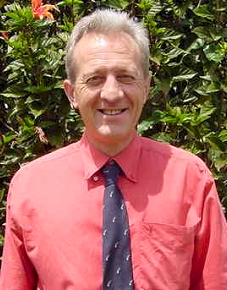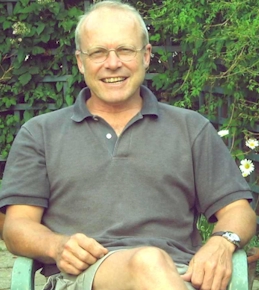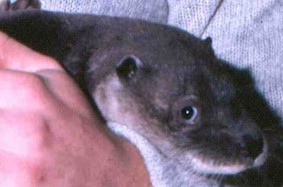 Nick Marsden’s book is called “Shedding Skin” and was published in paperback with 248 pages by Penguin New Zealand in September 2005 – ISBN 9780143020271.
Nick Marsden’s book is called “Shedding Skin” and was published in paperback with 248 pages by Penguin New Zealand in September 2005 – ISBN 9780143020271.
Nick briefly describes his book as: “my first novel, and it is intended to be a comic look at being an immigrant and learning English in New Zealand. The action centres around a dodgy English language school which is above a massage parlour in a sleazy part of the city. Aside from immigration, it also pokes fun at bio-security issues, as snakes start turning up in New Zealand when there aren’t supposed to be any”.
A review in the NZ Herald describes the plot: “Peter McCoy returns to New Zealand after an extended overseas experience in a number of countries, funded by teaching English to speakers of other languages. He is also in full retreat from his failed marriage, having lost his wife along the way to the charms of a snake-hipped South American lambada aficionado.
What Peter doesn’t know as he crosses the border at Auckland International Airport, and what the various border protection agencies don’t detect, is that he has a live, venomous snake in his hand luggage, where it slipped upon awaking from hibernation in the underpants of an immigrant Brazilian herpetologist.
Settling back into life in Auckland, Peter takes up a post doing what he has come to know well: teaching English to foreigners. In the shabby premises of the Authentic Realia College of English (ARCE, presumably with a soft C) in Port St, upstairs from The Pink Thing massage parlour, he wrestles with the linguistic deficiencies of a band of accomplished, highly-qualified taxi drivers, hospital orderlies, prostitutes and cleaning ladies from all parts of the world. The snake, meanwhile, which has made good its escape from his luggage, does some settling in of its own.
There’s plenty to like about this good-natured debut from Auckland writer Nick Marsden, whose day-job is ESOL teacher at Unitec and who is, one fancies, the real McCoy.
The stories of Peter’s students struggling to find their feet in New Zealand are well told, and piquant with the ironies of immigration: a North African urologist drives taxis until, after one assault by a drunken patron too many, he quits to work for a fellow language student, Ivan, who has founded a garden services empire; the Serbian civil engineer, who spots at a glance a solution to Auckland’s traffic problems, can’t find any sort of job and resolves to take up bee-keeping; an Algerian dentist makes good with her belly-dancing company.
Meanwhile, a crusading politician, a former schoolmate of Peter’s, thunders about the risks posed to the New Zealand way of life by immigrants and immigration. But when this man’s diary falls into Peter’s possession one day, he learns that the self-appointed guardian of all things Newzild is a far from savoury character himself; the fugitive snake is woven throughout as a metaphor for the various real threats we overlook while our attention is diverted.
Although, at times, the reach of Marsden’s exuberance somewhat exceeds the grasp of his prose — metaphors are mixed, obscure puns are made and jokes suffer through heavy-handedness — you can forgive it plenty. And it’s a salutary reminder that as the world changes, so must the face of our country and our people, and not necessarily for the worse”.
 Pete Talbot writes: “In the summer of 1976 I was asked by film director David Cobham to begin training at The Otter Trust in Norfolk under the supervision of Philip and Jeanne Wayre. The purpose of this was in preparation for a unique filming adventure – the making of Henry Williamson’s wonderfully poetic nature story, Tarka the Otter, into a feature film. During my time at The Otter Trust I hand raised a baby otter with Jeanne Wayre so that he would ‘imprint’ and I would be able to handle him whilst filming in the open countryside. We called the little otter ‘Spade’ and so I embarked on the most extraordinary wildlife experience. After training my otter and I went to live in a magical old water mill in Hampshire, the home of Ron and Rose Eastman. They were wildlife film-makers, already well known for their work with kingfishers. In time we had five otters living there, a barn owl, a goose and Ron & Rose’s enormous German Shepherd dog ‘Fritz’; a surprisingly harmonious group!”
Pete Talbot writes: “In the summer of 1976 I was asked by film director David Cobham to begin training at The Otter Trust in Norfolk under the supervision of Philip and Jeanne Wayre. The purpose of this was in preparation for a unique filming adventure – the making of Henry Williamson’s wonderfully poetic nature story, Tarka the Otter, into a feature film. During my time at The Otter Trust I hand raised a baby otter with Jeanne Wayre so that he would ‘imprint’ and I would be able to handle him whilst filming in the open countryside. We called the little otter ‘Spade’ and so I embarked on the most extraordinary wildlife experience. After training my otter and I went to live in a magical old water mill in Hampshire, the home of Ron and Rose Eastman. They were wildlife film-makers, already well known for their work with kingfishers. In time we had five otters living there, a barn owl, a goose and Ron & Rose’s enormous German Shepherd dog ‘Fritz’; a surprisingly harmonious group!”
Sadly I no longer work with animals. After the movie I did spend several years working with, first Tigers then African Elephants. I did have some royalties from Tarka but even so, working in the animal world, it was very hard to make ends meet. My father had associations in The Netherlands and when I married Imogen, I left zoo’s and went to work in Deventer (near Arnhem, Netherlands) in the printing industry. We had a happy life there spending our time between Deventer and Mayenne in France where we renovated an old cottage.
 When our eldest son Sam was born, we decided to return to the UK and we bought a house in Dereham. We soon had our second lad Robin and I worked for a book wholesaler in Norwich before joining a friend’s business in Dereham. Last year a researcher from Channel 4 TV called with an interest in how we made “Tarka the Otter” all those years ago (because nothing had ever been written about it.)
When our eldest son Sam was born, we decided to return to the UK and we bought a house in Dereham. We soon had our second lad Robin and I worked for a book wholesaler in Norwich before joining a friend’s business in Dereham. Last year a researcher from Channel 4 TV called with an interest in how we made “Tarka the Otter” all those years ago (because nothing had ever been written about it.)
I had copious notes and photographs for a book of the project (which was two years in the making). I am still friends with David Cobham (Director of the movie) and, knowing of my interest in Henry Williamson’s ‘First World War’ writing, he put me in touch with Richard and Anne Williamson (son and Daughter in law and biographer of Henry Williamson the Author). All of which nudged me into putting my book together and building the website for my book “Tarka and Me”. I am still looking for a publsher for “Tarka and me” and am currently also working on another book! More news on that later”.

Comments
Join the conversation
Log in to add your comment
0 comments